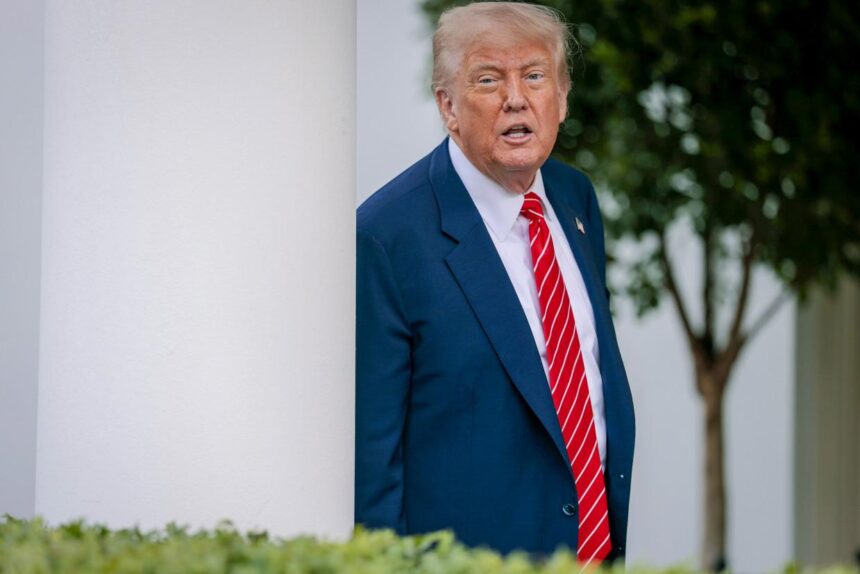Trump’s Millionaire Tax Proposal: A New Chapter in GOP Fiscal Debate
In a notable shift from traditional Republican tax policies, former President Donald Trump has introduced a plan to levy additional taxes on millionaires, stirring considerable discussion within the GOP. This initiative, which aims to increase the tax burden on the wealthiest Americans, diverges sharply from the party’s historic emphasis on low taxes and limited government interference. As Republican leaders and constituents evaluate the ramifications, this proposal is redefining conversations around fiscal policy and political tactics ahead of the next election cycle.
Reimagining GOP Tax Ideals: The Millionaire Tax Proposal
Trump’s unexpected call for a tax increase on millionaires has unsettled the Republican establishment, which has long championed tax cuts for high earners as a driver of economic prosperity. This proposal challenges the conservative doctrine that wealth should be largely free from heavy taxation. Advocates of the plan argue that the additional revenue could be pivotal in financing critical public services and infrastructure, marking a pragmatic shift to address the growing wealth gap in America.
Highlights of the proposed tax changes include:
- An extra 5% tax on annual incomes exceeding $10 million.
- Closing loopholes by taxing capital gains and dividends more aggressively.
- Allocating the new funds to bolster education and healthcare systems.
| Tax Category | Projected Revenue (Billion $) | Designated Use |
|---|---|---|
| 5% surcharge on incomes above $10M | 120 | Education Enhancement |
| Capital Gains and Dividends Tax Increase | 80 | Healthcare Expansion |
While some moderate Republicans and Democrats praise the proposal as a responsible fiscal adjustment, many conservatives see it as a departure from foundational GOP tax beliefs. The party now faces a critical debate: uphold traditional tax policies or adapt to shifting economic realities and voter expectations.
Analyzing the Economic Impact of Taxing the Wealthy
Raising taxes on affluent individuals, as suggested by Trump’s plan, carries complex economic implications that challenge the GOP’s conventional wisdom. Supporters contend that increased tax revenues could fund vital infrastructure projects and help reduce the national deficit. Conversely, opponents caution that such tax hikes might deter investment, slow economic momentum, and encourage capital relocation abroad. The ultimate effects hinge on the specifics of tax implementation and how the government channels the additional funds.
Key economic considerations include:
- Investment Behavior: Elevated taxes might reduce incentives for entrepreneurial ventures among the wealthy.
- Wealth Redistribution: Higher taxes could narrow income disparities and strengthen social safety nets.
- Public Spending Efficiency: Effective use of funds could stimulate employment and economic mobility.
- Market Stability: Uncertainty around tax policy may influence investor confidence and business planning.
| Economic Factor | Expected Effect |
|---|---|
| Government Revenue | Projected increase of 10-15% |
| GDP Growth Rate | Potential slight decline (~0.5%) |
| Investment Levels | Moderate reduction anticipated |
| Income Inequality | Estimated decrease by 8% |
Republican Lawmakers’ Reactions to the Tax Shift
The GOP is navigating a challenging crossroads as Trump’s millionaire tax proposal contradicts decades of party orthodoxy favoring minimal taxation on the wealthy. Many conservative members openly question the plan, concerned it could alienate key donors and undermine the party’s economic agenda. However, a growing contingent within the party acknowledges the political necessity of addressing wealth inequality to appeal to a broader electorate. This internal tension has sparked vigorous discussions on Capitol Hill, with some Republicans signaling openness to a more flexible approach in the lead-up to elections.
Behind closed doors, Republican strategists are exploring ways to reconcile opposition to the tax hike with pragmatic governance. Potential approaches include:
- Implementing targeted tax increases alongside incentives for small businesses.
- Prioritizing deregulation to stimulate economic growth.
- Framing the millionaire tax as essential for funding infrastructure and national security.
| Response Category | Support Level | Main Concern |
|---|---|---|
| Complete Opposition | Moderate | Risk of Losing Donor Support |
| Conditional Support | Growing | Political Feasibility |
| Strategic Compromise | Limited | Effective Messaging |
The GOP’s decision on this issue could redefine its fiscal philosophy and electoral strategy for years ahead.
Bridging GOP Divides: Approaches to Tax Reform Consensus
Reconciling the Republican Party’s internal divisions over the millionaire tax requires careful negotiation. The clash between staunch fiscal conservatives and pragmatic moderates calls for transparent communication and evidence-based discussions. Creating forums where members can express concerns openly is vital to fostering unity.
Emerging strategies to manage party discord include:
- Refined Messaging: Positioning the tax increase as a safeguard for small businesses and middle-class prosperity.
- Building Alliances: Encouraging collaboration between libertarian-leaning and establishment Republicans to find shared solutions.
- Gradual Implementation: Introducing phased tax hikes to mitigate fears of sudden economic shocks.
| Party Faction | Primary Concern | Proposed Compromise |
|---|---|---|
| Fiscal Conservatives | Threats to economic growth | Limit tax increase to 2% |
| Moderates | Reducing income inequality | Phase in hikes over five years |
| Populists | Closing elite tax loopholes | Eliminate specific deductions |
Looking Ahead: The Future of GOP Tax Policy
As the debate over taxing millionaires intensifies, former President Trump’s proposal is challenging entrenched Republican tax doctrines. Whether this initiative will catalyze a strategic transformation within the GOP or deepen internal rifts remains uncertain. What is undeniable is that the discourse surrounding tax reform will significantly influence both the party’s trajectory and the broader national economic conversation in the years to come.










